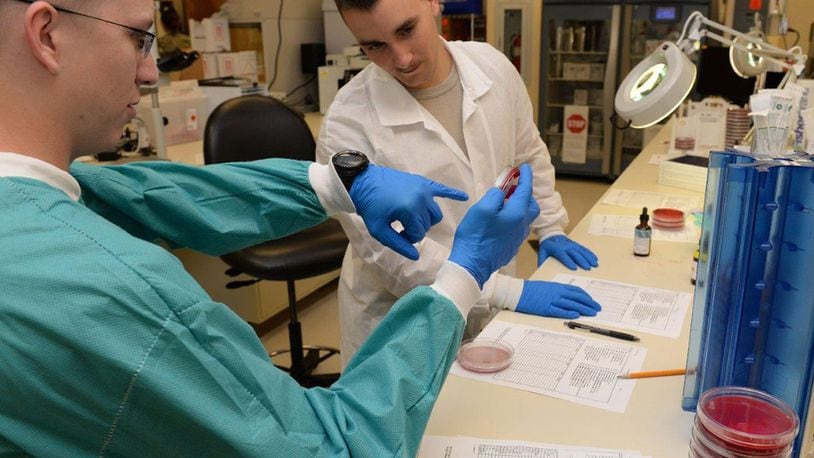Clinic physicians rely on the microbiology laboratory in the treatment of patients.
“They are very helpful in guiding antibiotic therapy and treating patients optimally,” said Maj. David Lindholm, an infectious disease physician in the 88th Medical Operations Squadron. “We are talking with microbiologists every day to hone in on what is causing infection.”
The 88 DTS microbiologist lab technicians perform diagnostic tests of patient samples and analyze cells underneath a microscope to determine what bacteria or microorganisms may be lurking within them.
“Initially you have to be able to recognize an organism’s characteristics on the agar plate and understand the conditions that it best grows in, to know the direction of testing to go,” said Erin Penney, 88 DTS microbiology technical supervisor.
The common types of microorganisms the team reviews range from throat, stools and urine to other cultures such as wounds and blood.
Once a swab sample has been taken from a patient it is sent to the lab to discern whether it is normal or pathogenic, which takes a great level of skill and practice.
“They give us insight on what’s going on, before we have the final results of the culture,” said Lindholm.
A microbial culture is a method of growing microbes in a predetermined medium under controlled laboratory settings.
While evaluating microbial organisms, the team uses its vast knowledge of the bacteria and other microbes normally found in the body to rule out if it is pathogenic.
The 88 DTS microbiology team has a new analyzer machine, which is proving instrumental to the microbiology lab team and saving time by helping identify the most effective treatment based on the offending microbe and area infected.
“For instance, there are certain drugs that can’t be turned out on certain body sites for certain microbes, and that’s because research will tell you that drug is not good in getting into that body site or maybe it’s not good at getting into that body site after that particular bacteria,” Penney said. “So, we want to make sure those types of drugs and microbe combinations are not relayed to the provider so they stay away from those drugs and they know which ones they should use for that particular site.”
Additionally, the 88 DTS microbiology lab team plays a role in the Department of Defense Flu Season Surveillance Program.
The specimen of any patient, whether admitted or seen in the emergency room, that has been diagnosed with the flu is submitted to the U.S. Air Force School of Aerospace Medicine epidemiology lab.
The epidemiology lab studies that specimen to determine what strain of flu it is. The data is then sent to the Centers for Disease Control to do a routine surveillance of circulating flu strains for potential vaccine candidates.
With the upcoming flu season, it can be difficult for someone to tell if they have a bacterial or a viral infection.
“If you are feeling very ill, timing is of the essence,” said Penney. “Many folks will wait too long to see a physician, and the longer a bacteria is allowed to grow and develop, the more are released in the body.”
The efforts of the microbiology team at Wright-Patterson AFB can help. It works to get results in a timely manner.
“We know at the end of that, is a patient waiting to have the appropriate treatment, and I can’t say enough for the micro team; they are really passionate to find out what is causing someone to be ill and if they have questions, they are researching to find answers,” said Penney.
“My favorite part is I like seeing the results you can get; the more questions you ask, the more you learn,” said Shannon Heil, 88 DTS microbiology laboratory technician.
About the Author
